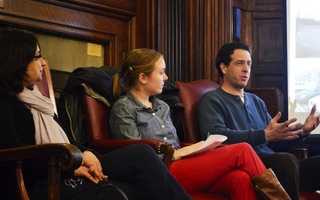While University officials focus on raising money for House renewal and development in Allston as goals for Harvard’s upcoming capital campaign, Allston residents are skeptical about how high of a priority the revitalization of their neighborhood will be.
Residents fear that with the University focusing on the renovation of undergraduate housing, Harvard’s holdings in Allston will not be developed any time in the near future.
“Allston’s always the first priority after other things,” local resident and Harvard-Allston Task Force member Bruce E. Houghton said.
Last week, University President Drew G. Faust said that Harvard continues to be committed to Allston and that the University is continually searching for practical ways to move forward on developing Western Avenue given the available financial resources.
Specific future developments in the neighborhood, however, remain unclear.
“People here are really tired of looking at Harvard’s empty warehouses and underutilized properties,” Allston resident Harry E. Mattison said.
Over the past year, the University has leased its property to 13 businesses and non-profits in the area including Genzyme, the Silk Road Project, and the Boston Boxing Club, according to University spokesperson John D. Longbrake.
“Harvard owes us something,” said longtime resident Tom Lally. “Harvard made a deal with us through the science center that they would make the neighborhood better.”
After halting construction of the Allston Science Complex due to financial constraints in Dec. 2009, Harvard is now in the planning processes of building an Innovation Lab—a space where locals and University affiliates could discuss and realize their business plans through collaboration.
The Allston Work Team—created by Faust due to the halted construction—is also scheduled to make recommendations this summer. Decisions about the University’s capital campaign will not affect the Work Team’s efforts, which concern the short- and long-term development of Harvard’s properties in Allston, according to Bill Purcell, co-chair of the Work Team.
“We are looking for ways to move forward as best we can, in ways that Harvard never looked before,” said Purcell.
Residents, however, are unsure if renovations will happen in the near future.
“Harvard talks in centuries, not in months and years,” said Lally. “We didn’t think it would take such a long time.”
According to Kevin Casey, associate vice president for public affairs and communications, the capital campaign will not make Allston less of a priority for Harvard and improvements—such as the I-Lab, the Charlesview development, and the library park—are underway.
Asked how Allston may fit into the larger fundraising effort, Faust said in an interview last week that “Allston is a very important part of the future of the University.”
Still, Mattison feels something more is needed to make Allston a full priority.
“It will take a major change of heart from people who make decisions at Harvard,” Mattison said.
—Staff writer Nathalie R. Miraval can be reached at nmiraval@college.harvard.edu.
This article has been revised to reflect the following corrections.
CORRECTION: MAR. 8, 2011
The Mar. 8 article "Allston Residents Concerned About Harvard Capital Campaign Priorities" incorrectly referred to Tom Lally as Tom Willey. His correct last name is Lally. Additionally, the story misattributed a statement by a University spokesperson about Allston's priority in the forthcoming capital campaign. The statement was made by Kevin Casey, associate vice president for public affairs and communications.
Read more in News
Women Tackle Beauty StandardsRecommended Articles
-
Commitment to Old Allston Plans in FluxUniversity officials say they continue to consider the conditions of previous agreements they made with the City of Boston before the December halt of construction on the Allston Science Complex in brainstroming plans for Harvard’s development in the neighborhood.
-
Faust Updates on AllstonUniversity President Drew G. Faust wrote in a letter to Allston residents last week that Harvard continues to make progress on a three-phase plan outlined in her last letter, adding that Harvard continues to lease land in the neighborhood, extend short-term lease contracts, and make plots more attractive to buyers.
-
 Allston Residents Call for Detailed Plans
Allston Residents Call for Detailed Plans -
 SLAM Brings Allston Debate into Harvard Yard
SLAM Brings Allston Debate into Harvard Yard -
Harvard's Barry's Corner Projects ApprovedHarvard’s proposal for the Barry’s Corner Residential and Retail Commons in Allston was unanimously approved by the Boston Redevelopment Authority board Thursday evening. The project is slated to break ground in the fall of 2013.
-
Harvard-Allston Task Force Debates Community Benefits PrioritiesMembers of the Harvard-Allston Task Force continued to debate their priorities for community benefits at their meeting Monday evening as part of an ongoing discussion about Harvard’s Institutional Master Plan for Allston development.













